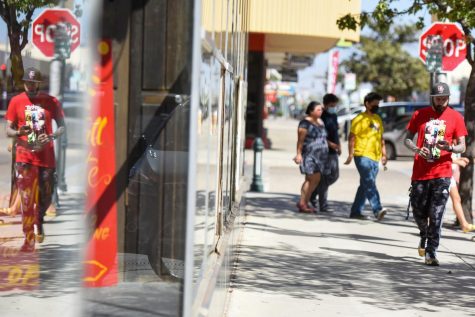Coronavirus delays Cirque du Soleil show debut
March 12, 2020
Cirque du Soleil’s “Axel,” was set to open at Mechanics Bank Arena on March 12, but based on the recommendation by California authorities, the scheduled performances were canceled due to growing concerns over the coronavirus pandemic.
“Axel,” was a unique variant to Cirque du Soleil’s existing lineup. The show combined acrobatics, figure skating and free skating to develop a high-energy production.
According to press attache Julie Desmarais, “‘Axel’ was inspired by the energy and the atmosphere you find at a concert or a sports gathering inside of the arena.”
The production, however, was not solely a spectacle. The show also had substance and told a vibrant story about Axel’s journey to find recognition and personal growth.
The story component to shows like “Axel,” is important to audiences, according to Desmarais. Audiences invest themselves in the story and diligently follow along, but they also use their imaginations to embark on a fantasy quest.
Stunts, visuals, sounds and storylines are equally important to put on a captivating show. One element is not more important than the other but combined, they make a show that can resonate with audience members in at least one way.
The presence of a story, however, did not mean that the show would be void of daring tricks and action.
“There’s lots of very bold lighting projections and projections onto the ice. There’s some [pyrotechnics] as well to elevate the skating and the acrobatics,” Desmarais said.
Putting on such an extravagant show like “Axel,” that has an infinite amount of moving parts is a large undertaking. For months, the team did research, allotment and workshops to see if what they wanted to do was realistic.
“We always aim to push the boundaries, push the element of acrobatics further,” Desmarais said.
The performers also spent months training for the show after they were cast. The acrobats had to learn how to skate and adjust their acrobatics to account for the addition of 10-pound skates. The trained skaters and freestylers had to learn how to share the ice with an ensemble of artists. They also learned a new style of choreography.
Such demands on the artists for an intense show like “Axel,” can be grueling and exhausting. The cast does anywhere between three to nine shows in a week, but the company takes many precautions to keep the performers well.
“We have two performance medicine specialists that travel with us. We hire in every city a massage therapist also to provide some services. We have one skating coach, one acrobatic coach that works very closely with the artists,” Desmarais said. “And also, when we do training… we want to minimize the risk because the performance is already very high. But safety is always our main priority. We try to minimize the risk that an artist could encounter by always providing all the services they need to always stay in top conditions.”
As Cirque du Soleil Entertainment Group works to reschedule dates, a touring team of 90 people waits in limbo to put on a show that has been many intense months in the making.








